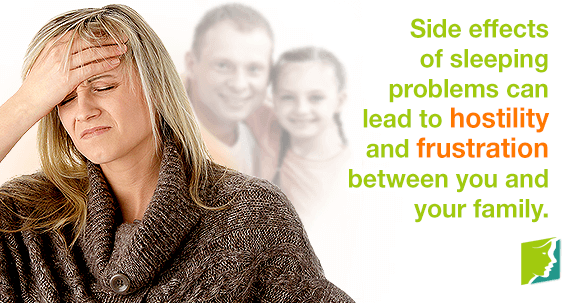Unfortunately, sleep disorders are common during menopause. Hormonal equilibrium is essential for a good night's rest, but when hormone levels are off balance, it can strongly disturb your sleep. During the menopause transition, sex hormones such as estrogen and progesterone are lowered. As a result, it becomes much harder to stay and fall asleep.
While you are the main victim of your disorder, your family may also be affected. Whether it is your spouse during the night or your kids the next day, your sleeplessness may be affecting them more than you realize.
Types and Symptoms
The symptoms of your disorder depend on what type you are experiencing. If you have insomnia, for example, it can be nearly impossible to fall or stay asleep. You can lay awake for hours in the middle of the night tossing and turning, to no avail. If you have sleep apnea, then you may be awoken by a gasp for air, as this is a disorder characterized by a closing of the airways during the night. If you have restless leg syndrome, you may be disturbed by an unpleasant electric feeling in your legs.
Side Effects of Sleep Disorder
As if it weren't bad enough that you can't sleep all night, you have to wake up the next morning heavy-eyed and unprepared for a full day of responsibilities. Sleeping problems can lead to difficulty concentrating, fatigue, exhaustion, headaches, and depression. It can be hard to put thoughts together and something as simple as grocery shopping can seem impossible. It can be aggravating to deal with, and the lack of relief can make you irritable and unproductive.
Impact on Your Family
During the night, your tossing and turning can cause your spouse to wake up as well. It can also be particularly concerning for them if you have sleep apnea, as your gasping upon wake can be cause for alarm and any snoring tends to be louder than usual. This can lead to hostility and frustration between you, where one may end up sleeping on the couch.
During the day, because you may be so irritable and slow-thinking, it can be hard to be as reliable for your family. You may be more likely to snap at a family member, and unable to attend events because you're so exhausted.
Natural Remedies
Luckily, there are ways to safely and effectively reclaim your ability to have a restful night's rest with a couple of lifestyle adjustments. For one, try to avoid eating large meals or exercising two hours before bedtime. When it comes to caffeine and alcohol, avoid them four hours before sleep. Also, make sure TV and computer screens are shut off while you're lying in bed.
Further, herbs such as valerian and lemon balm are herbal remedies for inducing sleep. This is because they work on gamma-aminobutyric acid receptors in the brain, which helps promote tranquility.
Sleep time is the most important time of your day. It allows your body and mind recharge for a brand new day. Try to stick with the natural remedies mentioned above in order to avoid disturbing your spouse's sleep, while maintaining a strong bond with your children, siblings, and parents as well.
Sources
- National Institutes of Health. (2014). Sleep Disorders. Retrieved June 23, 2014, from http://www.nlm.nih.gov/medlineplus/sleepdisorders.html
- Taavoni, S. , Nazem Ekbatani, N. & Haghani, H. (2013). Valerian/lemon balm use for sleep disorders during menopause. Complementary therapies in clinical practice, 19(4), 193-196. doi: 10.1016/j.ctcp.2013.07.002
- University of Maryland Medical Center. (2013). Adult Sleep Disorders. Retrieved June 23, 2014, from http://umm.edu/programs/sleep/health/sleep-disorders/adult
- University of Maryland Medical Center. (2011). Valerian. Retrieved June 23, 2014, from http://umm.edu/health/medical/altmed/herb/valerian




